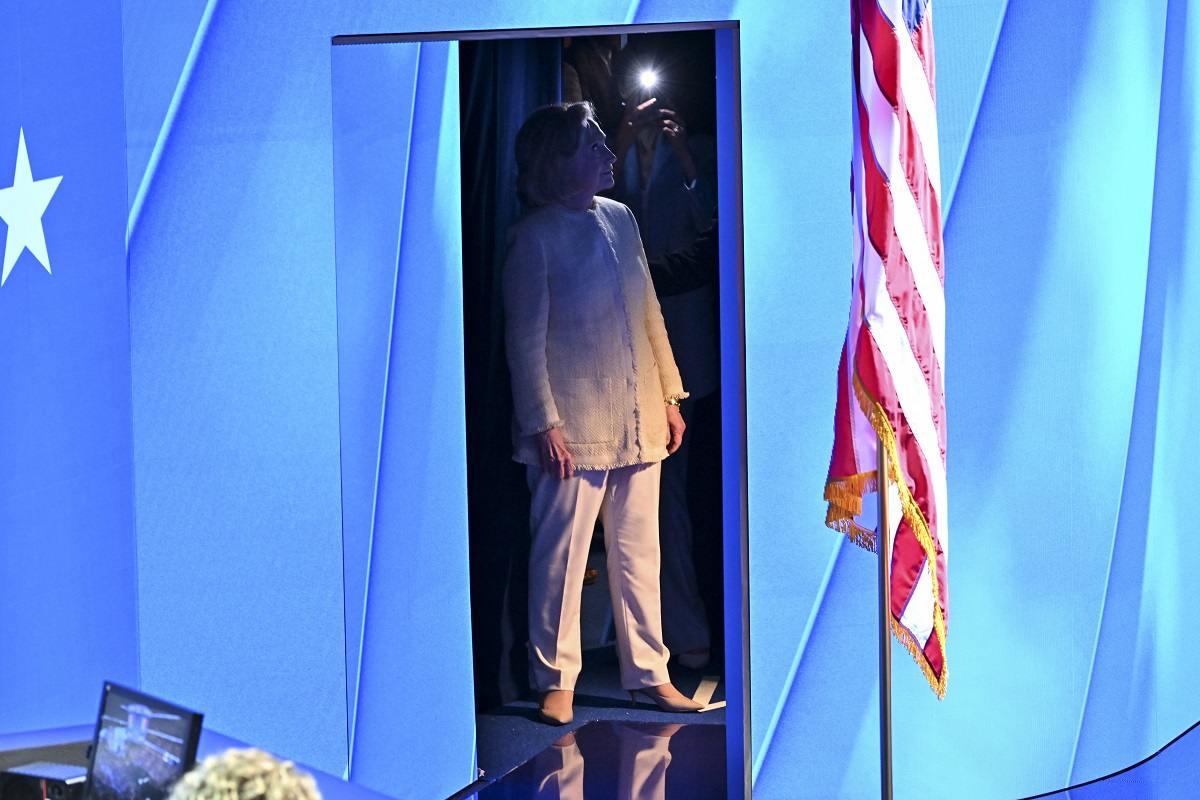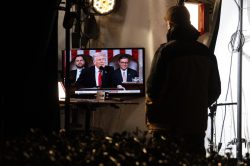
Hillary Clinton, former secretary of state and 2016 Democratic presidential nominee, stands backstage before speaking oat the Democratic National Convention in August.
14:00 JST, September 19, 2024
Kim Hale and her sister, Kathy Hatcher, showed up in Kamala Harris 2024 T-shirts. “K” pendants – “for Kamala,” they said – hung around their necks. But tonight they were here for a different Democratic nominee.
“Seeing Hillary Clinton speak is on my bucket list,” said Hale, 63, who had traveled all the way from Athens, Ohio, so she and her sister could catch the first stop of Clinton’s new book tour in downtown Washington. Both women wore Clinton buttons from 2016 with their Harris regalia. “She’s one of the brightest women ever,” Hale continued, “and it broke my heart the night she didn’t win.”
Clinton, you may have noticed, is back. She appeared last month on the first night of the Democratic National Convention, bellowing about Donald Trump’s felony convictions and then smirking and nodding as an arena of Democrats chanted “Lock him up!” She wrote a new memoir, “Something Lost, Something Gained,” which promises personal reflections but lingers mostly on present-day politics. With a new book comes a book tour, and Clinton has 16 events scheduled before Election Day. The former first lady, U.S. senator, secretary of state, and Democratic presidential nominee returns to the political consciousness like a ghost with her own unfinished business: helping a woman head off a Trump presidency.
Does anybody still want to hear from her?
The answer is yes.
“Don’t blame me, I voted for Hillary,” declared the T-shirt of a man waiting to buy a copy of the book ($29.99 plus tax). Some brought swag celebrating Ruth Bader Ginsburg, the late Supreme Court justice – whom Clinton did not have the opportunity to replace, because she lost. Some wore “Trust Women” pins or “Pantsuit Nation” T-shirts and dusted-off praise for “the most qualified person to ever run for president.”
They were With Her, still. The Democratic shock-horror of eight years ago seems strangely distant – never mind the distinct possibility that their nightmare might soon repeat itself. The 3,000-plus crowd of mostly white, mostly older, mostly women who filed into DAR Constitution Hall on Monday night seemed to regard Clinton’s reappearance on the political scene not as an ill omen but as a benevolent spirit – as if communing with a Ghost of Elections Past might help to manifest a brighter future.
Spotted: Terry McAuliffe, the former Virginia governor and Clinton confidant was in attendance. Spotted: Bob Barnett, a longtime Clinton lawyer and confidant who negotiated her book deals. Spotted: Cassidy Hutchinson, the former Trump White House staffer turned star January 6th committee witness (and Barnett client), clutching a copy of Clinton’s tome as she exited the theater.
Not spotted: any apparent resentment, or even mixed feelings, for the woman whose something lost was an election that changed everything.
“Secretary Clinton laid the foundation for this moment,” said Thomas Howard, 47, a federal worker who lives in Washington.
“She’s a personal hero of mine,” said Angie Fritz, 55, from Front Royal, Va.
“We have another female candidate now running for president,” said Stacy Chittick, a self-described “recovering attorney” from Alexandria, Va., “so I think she still will have a lot of very hopeful and encouraging messages.”
Chittick had purchased tickets when Biden was still running for president. Back then, she’d looked forward to the Clinton event as a pick-me-up. “Given the direction of where the campaigns were going at that time, I needed something uplifting,” she said. “I knew she would have the right words to say.”
Clinton took the stage with former news anchor Katie Couric, another woman who had broken barriers only to fall short. (Couric was the first woman to lead a major network’s nightly news broadcast but left after five years of dismal ratings, later reflecting that she was “not sure if the country was ready for a female anchor.”) Now, they both host podcasts.
It was a night for each to reclaim some lost version of themselves. Couric couldn’t resist being the newsmaker: She pressed Clinton for her take on the most recent attempt on Trump’s life (“It was horror”) and how he’d responded on social media in its aftermath (“If he were really a leader,” she said, “he should be doing what he can to calm the waters”). Clinton, meanwhile, reminded the room that she’d once brokered a cease-fire between Israel and Hamas, back in 2012 (cautious applause). She warned that the Supreme Court’s conservative bloc might go after same-sex marriage and that Trump and the Republicans might push a national abortion ban. She imagined a world in which the Republican Party might find “its conscience and its backbone” if Trump was defeated in November. She talked about the Americans who still approach her in tears about what happened eight years ago. “People know it was an unprecedented election,” she said.
This year’s election does have precedence, in certain ways. Inevitably, much of the conversation between Clinton and Couric centered on the latest attempt to make history while keeping Trump out of the White House. Observers have noted that Harris tends not to focus on the historic aspects of her would-be presidency, a strategy Clinton seemed to approve of (“She doesn’t need to”). And yet Clinton herself seems as comfortable as ever talking about the highest, hardest glass ceiling, and the Washington crowd was here for it. “I wasn’t sure how I would feel when another woman would be so close to breaking that hardest glass ceiling – and I was thrilled,” she said, to explosive applause.
But there was this, too: “Let’s not overlook the fact,” Clinton said, “there will be some who just can’t bring themselves to vote for a woman.” She paraphrased a quote from Shirley Chisholm, the trailblazing congresswoman from New York who ran for president in 1972: I have certainly met much more discrimination in terms of being a woman than being black, in the field of politics. It was the reason, Clinton said, that Democrats needed to be “very vigorous” in their support of Harris’s campaign.
Outside, after the event, a Clinton fan named Lisa Pafe waited for her Uber. She’d enjoyed hearing Clinton’s perspective, but the ghost’s unfinished business was now haunting her, too.
“Harris is not only a woman, but a Black woman, and there’s still a lot of prejudice,” Pafe said. “I’m hopeful, but I’m still concerned.”
Top Articles in News Services
-

Survey Shows False Election Info Perceived as True
-

Hong Kong Ex-Publisher Jimmy Lai’s Sentence Raises International Outcry as China Defends It
-

Japan’s Nikkei Stock Average Touches 58,000 as Yen, Jgbs Rally on Election Fallout (UPDATE 1)
-

Japan’s Nikkei Stock Average Falls as US-Iran Tensions Unsettle Investors (UPDATE 1)
-

Trump Names Former Federal Reserve Governor Warsh as the Next Fed Chair, Replacing Powell
JN ACCESS RANKING
-

Producer Behind Pop Group XG Arrested for Cocaine Possession
-

Japan PM Takaichi’s Cabinet Resigns en Masse
-

Man Infected with Measles Reportedly Dined at Restaurant in Tokyo Station
-

Israeli Ambassador to Japan Speaks about Japan’s Role in the Reconstruction of Gaza
-

Videos Plagiarized, Reposted with False Subtitles Claiming ‘Ryukyu Belongs to China’; Anti-China False Information Also Posted in Japan

























